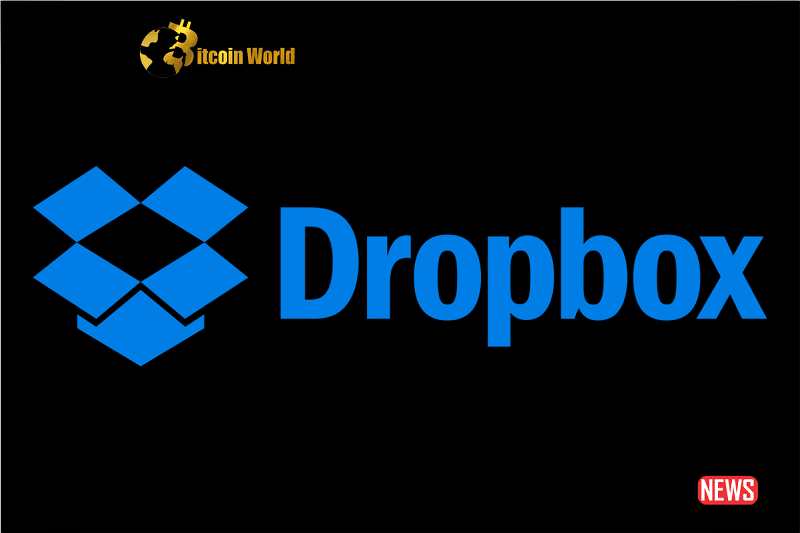Remember the days of ‘all the space you need’ with Dropbox? It sounds like a dream, right? Especially if you’re into resource-intensive activities like cryptocurrency mining. Well, that dream just ended for Dropbox users. The cloud storage giant has pulled the plug on its unlimited storage plan, and a significant reason boils down to a few bad apples leveraging the service for activities like cryptocurrency mining. Let’s dive into what happened and what it means for you.
Why the Sudden Shift? Was Crypto Really the Culprit?
Dropbox initially envisioned a diverse range of usage among its subscribers. However, recent times saw an unprecedented spike in storage consumption by a small fraction of users. We’re talking usage levels thousands of times higher than typical business customers! And what were these super-users up to? You guessed it – activities like cryptocurrency mining, particularly Chia mining, were major culprits. It wasn’t just crypto, though. Dropbox also flagged reselling storage and individuals pooling resources for personal use as contributing factors.
Think of it like this:
- Imagine a buffet where most people take reasonable portions.
- Then, a few individuals start clearing out entire trays, leaving little for everyone else.
- That’s essentially what happened with Dropbox’s unlimited storage.
Is This Just a Dropbox Thing?
Interestingly, Dropbox isn’t alone in this decision. Tech titans like Microsoft and Google have also recently bid farewell to their unlimited storage offerings. This points to a broader industry trend: the inherent challenges of sustaining truly unrestricted cloud storage. Maintaining such a system while ensuring fair resource allocation and preventing abuse is proving increasingly difficult.
What Does This Mean for Dropbox Users?
The immediate impact is clear: new Dropbox accounts now have a storage cap of 15 terabytes. While this is still a substantial amount for most users, the shift away from ‘unlimited’ is significant. Dropbox acknowledges this change might be unwelcome for some. However, they argue that creating and enforcing an exhaustive list of prohibited activities is simply not a sustainable solution.
Cryptojacking and Cloud Mining: A Growing Concern?
The Dropbox situation highlights a critical security issue: cryptojacking. This involves deploying malware onto devices or cloud accounts to secretly mine cryptocurrencies. Imagine malicious software hijacking your cloud storage resources to generate digital currency for someone else! Google even reported instances where attackers could compromise their storage platform and deploy mining software in a mere 22 seconds. This underlines the vulnerability of cloud services to such exploits.
Striking a Balance: Value vs. Misuse in the Cloud
The decision by Dropbox and other major players underscores the delicate balancing act tech companies face. Offering unlimited storage is undoubtedly an attractive proposition, but the potential for misuse, particularly with the rise of cryptojacking, presents significant risks. Companies are now actively seeking ways to provide value to legitimate users while effectively mitigating these risks. This recalibration is likely to continue as the digital landscape evolves.
Key Takeaways: What You Need to Know
- End of an Era: Dropbox has discontinued its unlimited storage plan.
- Crypto’s Role: Excessive resource consumption for cryptocurrency mining was a significant factor.
- Industry Trend: Other major cloud providers have also moved away from unlimited storage.
- New Limits: New Dropbox accounts now have a 15 TB storage cap.
- Security Concerns: The incident highlights the risks of cryptojacking in cloud environments.
Looking Ahead: What Can We Expect?
The shift at Dropbox signals a broader re-evaluation of cloud storage models. While the allure of ‘unlimited’ is strong, the practicalities and security implications are forcing companies to adopt more sustainable approaches. Expect to see continued refinement of storage tiers and potentially stricter enforcement of usage policies across various cloud platforms. For users, this means understanding the storage limits and terms of service to avoid any disruptions. The era of truly limitless cloud storage, it seems, is fading into the digital sunset.
Disclaimer: The information provided is not trading advice, Bitcoinworld.co.in holds no liability for any investments made based on the information provided on this page. We strongly recommend independent research and/or consultation with a qualified professional before making any investment decisions.


